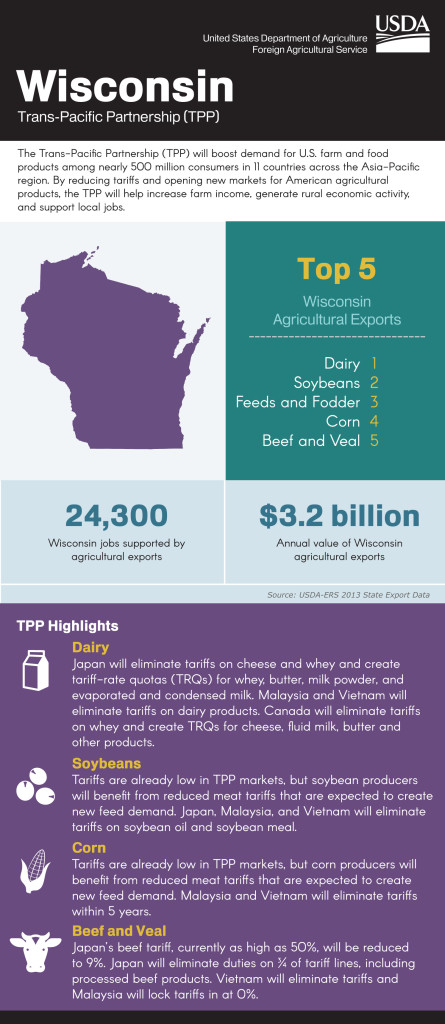Food and Ag Groups Comment on TPP Agreement
- Share
- Tweet
- Pin
- Share
Leaders from across the U.S. agriculture and food sector have continued to express their optimism and confidence in the newly reached Trans-Pacific Partnership (TPP) agreement. On Oct. 5, trade ministers from Australia, Brunei, Canada, Chile, Japan, Malaysia, Mexico, New Zealand, Peru, Singapore, the United States and Vietnam concluded negotiations for the TPP – one of the largest trade deals in recent history.
For America’s food and agriculture sector, which has remained a bright spot in the country’s economy for the past seven years, TPP would create more American jobs and drive the nation’s rural economy. U.S. agricultural trade with the 11 TPP countries accounted for 42 percent of U.S. agricultural exports in 2014, contributing $63 billion to the U.S. economy.
 As food and agriculture groups continue to review the final agreement, they expressed their support in the following statements:
As food and agriculture groups continue to review the final agreement, they expressed their support in the following statements:
Statement by Bob Stallman, president, American Farm Bureau Federation: “The Trans-Pacific Partnership has promised to open restricted markets for American business around the Pacific Rim….We hope the agreement will bring a more level playing field for farmers and ranchers by reducing tariffs and removing nonscience-based barriers to trade. The agreement covers markets that are expected to grow rapidly for decades to come. We expect to see increased access for our agricultural products, particularly some meats.”
American Feed Industry Association: “Trade agreements, which eliminate trade barriers overseas, play a critical role in the future of the feed industry as it opens doors to new markets globally. This is particularly important as the future growth of the U.S. animal agriculture industry depends on international consumers, particularly, the growing population and middle class,” said AFIA President and CEO Joel G. Newman. “TPP has the ability to ensure and create U.S. jobs, along with economically stronger rural communities.” Newman said the next step for AFIA is to review the final TPP text when it is released.
American Soybean Association: ASA President Wade Cowan, a farmer from Brownfield, Texas, issued the following statement: “ASA applauds trade ministers from the 12 nations that make up the Trans-Pacific Partnership for concluding an agreement that is intended to create more opportunities, economic growth and jobs. More than half of the soybeans produced by American farmers are exported overseas, and export markets are extremely important to our domestic livestock customers as well. This trade agreement has the potential to increase agricultural exports to new markets and to allow U.S. farmers to better compete in existing markets.”
Dairy Processors: “The International Dairy Foods thanks U.S. Trade Representative Michael Froman, U.S. Chief Agricultural Negotiator Darci Vetter and the entire U.S. interagency negotiating team for their hard work in bringing the Trans-Pacific Partnership negotiations to a close,” said Clay Hough, IDFA senior group vice president. “We look forward to reviewing the agreement’s dairy provisions as they become available.” The International Dairy Foods Association (IDFA) represents the nation’s dairy manufacturing and marketing industries and their suppliers, with a membership of 550 companies within a $125-billion a year industry. IDFA is composed of three constituent organizations: the Milk Industry Foundation (MIF), the National Cheese Institute (NCI) and the International Ice Cream Association (IICA). IDFA’s nearly 200 dairy processing members run nearly 600 plant operations, and range from large multi-national organizations to single-plant companies. Together they represent more than 85 percent of the milk, cultured products, cheese, ice cream and frozen desserts produced and marketed in the United States.
Cargill, a global trader, buyer and distributor of grain and other agricultural commodities: The conclusion of the Trans-Pacific Partnership negotiations in Atlanta takes the world a step closer to becoming more prosperous and more food-secure. Negotiators from 12 Pacific Rim nations including the U.S., Canada and Japan that together make up 40 percent of the world economy reached an accord over what would be the largest trade pact in history. TPP has the potential to set the standard for 21st century international trade, promoting the movement of goods, capital and ideas that spur economic growth, help combat world hunger, and raise labor and environmental standards. “In many parts of the world, food and agricultural products still face the legacy of high import barriers,” said David MacLennan, Cargill’s chairman and chief executive officer. “We believe the Trans-Pacific Partnership will allow food to move more freely across borders from places of plenty to places of need, which benefits farmers and consumers around the world.” Cargill encourages the governments of the TPP countries to follow through on the progress made by the negotiators, as TPP would benefit many sectors of the world economy, including food and agricultural production. Farmers in producing countries could potentially reach nearly 500 million new customers in Asia, who would in turn gain access to more affordable, higher quality products.
“Over time, the most successful countries have been those that embraced international trade,” MacLennan said. “Modern trade agreements like the TPP will continue that trend, while also setting high standards for labor, human rights and sustainability.”
